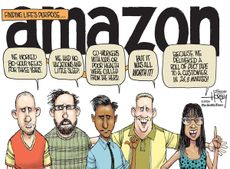Does universal credit discriminate against single parents?
Four female plaintiffs launch legal challenge to government’s flagship welfare programme

Four single working mothers have launched a high court legal challenge against universal credit, arguing the government’s flagship welfare reform programme has a design flaw which leaves some families hundreds of pounds a year worse off.
The women say the flaw, which relates to the way universal credit monthly payments are calculated, disproportionately affects working parents with children and leaves claimants with a “dramatically fluctuating income” and unable to budget from month to month.
In one case uncovered by the Child Poverty Action Group (CPAG) reported by The Guardian, a family’s monthly payment swung from £1,185 to zero, making budgeting impossible.
Subscribe to The Week
Escape your echo chamber. Get the facts behind the news, plus analysis from multiple perspectives.

Sign up for The Week's Free Newsletters
From our morning news briefing to a weekly Good News Newsletter, get the best of The Week delivered directly to your inbox.
From our morning news briefing to a weekly Good News Newsletter, get the best of The Week delivered directly to your inbox.
One of the women, Danielle Johnson, has claimed that as well as being irrational, the payment system is also discriminatory as it disproportionately affects single parents, who are predominantly female.
Last month, veteran MP Frank Field claimed the system was driving women in his constituency into sex work in a bid to avoid complete poverty.
A similar High Court case earlier this year found universal credit was unlawfully discriminating against severely disabled people.
Introduced to simplify the benefits system, rolling six types of payments under the old system into one, universal credit “has proven to be a highly controversial policy for the government”, says HuffPost UK, with delays to initial payments leaving some claimants relying on food banks and struggling to pay their bills.
There have also been reports of IT issues, massive overspends, administrative problems and delays to the scheme's roll-out.
Responding to claims it was fundamentally flawed, Neil Couling, from the Department for Work and Pensions, told the court yesterday that the system relied heavily on automation to process claims.
He added would cost “hundreds of millions of pounds” to redesign and that less than 1% of claimants lost out as a result of the problem.
Create an account with the same email registered to your subscription to unlock access.
Sign up for Today's Best Articles in your inbox
A free daily email with the biggest news stories of the day – and the best features from TheWeek.com
-
 'Republicans want to silence Israel's opponents'
'Republicans want to silence Israel's opponents'Instant Opinion Opinion, comment and editorials of the day
By Harold Maass, The Week US Published
-
 Poland, Germany nab alleged anti-Ukraine spies
Poland, Germany nab alleged anti-Ukraine spiesSpeed Read A man was arrested over a supposed Russian plot to kill Ukrainian President Zelenskyy
By Peter Weber, The Week US Published
-
 Today's political cartoons - April 19, 2024
Today's political cartoons - April 19, 2024Cartoons Friday's cartoons - priority delivery, USPS on fire, and more
By The Week US Published
-
 Home Office worker accused of spiking mistress’s drink with abortion drug
Home Office worker accused of spiking mistress’s drink with abortion drugSpeed Read Darren Burke had failed to convince his girlfriend to terminate pregnancy
By The Week Staff Published
-
 In hock to Moscow: exploring Germany’s woeful energy policy
In hock to Moscow: exploring Germany’s woeful energy policySpeed Read Don’t expect Berlin to wean itself off Russian gas any time soon
By The Week Staff Published
-
 Were Covid restrictions dropped too soon?
Were Covid restrictions dropped too soon?Speed Read ‘Living with Covid’ is already proving problematic – just look at the travel chaos this week
By The Week Staff Last updated
-
 Inclusive Britain: a new strategy for tackling racism in the UK
Inclusive Britain: a new strategy for tackling racism in the UKSpeed Read Government has revealed action plan setting out 74 steps that ministers will take
By The Week Staff Published
-
 Sandy Hook families vs. Remington: a small victory over the gunmakers
Sandy Hook families vs. Remington: a small victory over the gunmakersSpeed Read Last week the families settled a lawsuit for $73m against the manufacturer
By The Week Staff Published
-
 Farmers vs. walkers: the battle over ‘Britain’s green and pleasant land’
Farmers vs. walkers: the battle over ‘Britain’s green and pleasant land’Speed Read Updated Countryside Code tells farmers: ‘be nice, say hello, share the space’
By The Week Staff Published
-
 Motherhood: why are we putting it off?
Motherhood: why are we putting it off?Speed Read Stats show around 50% of women in England and Wales now don’t have children by 30
By The Week Staff Published
-
 Tonga’s tsunami: the aid effort turns political
Tonga’s tsunami: the aid effort turns politicalSpeed Read Efforts to help Tonga’s 105,000 residents have been beset by problems
By The Week Staff Published